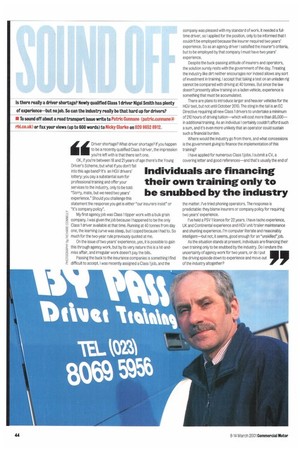Is there really a driver shortage? Newly qualified Class 1
Page 46

If you've noticed an error in this article please click here to report it so we can fix it.
driver Nigel Smith has plenty of experience—but nojob. So can the industry really be that hard up for drivers?
• To sound off about a road transport issue write to Patric Cunnane (patric.rAmnane®
rbi.s0.1110 or fax your views (up to SOO words) to Nick/ Clarke On 020 8652 8012.
6 Driver shortage? What driver shortage? If you happen
to be a recently qualified Class 1 driver, the impression you're left with is that there isn't one.
OK, if you're between 18 and 21 years of age there's the Young Driver's Scheme, but what if you don't fall into this age band? It's an HGV drivers' lottery: you pay a substantial sum for professional training and offer your services to the industry, only to be told: "Sorry, mate, but we need two years' experience." Should you challenge this statement the response you get is either our insurers insist" or "it's company policy".
My first agency job was Class I tipper work with a bulk grain company. I was given the job because I happened to be the only Class 1 driver available at that time. Running at 40 tonnes from day one, the learning curve was steep, but I coped because I had to. So much for the two-year rule previously quoted at me.
On the issue of two years' experience, yes, it is possible to gain this through agency work, but by its very nature ths is a hit-andmiss affair, and irregular work doesn't pay the bills.
Passing the buck to the insurance companies is something I find difficult to accept. I was recently assigned a Class 1job, and the company was pleased with my standard of work. It needed a fulltime driver, so I applied for the position, only to be informed that I couldn't be employed because the insurer required two years' experience. So as an agency driver I satisfied the insurer's criteria, but to be employed by that company I must have two years' experience.
Despite the buck-passing attitude of insurers and operators, the solution surely rests with the government of the day. Treating the industry like dirt neither encourages nor indeed allows any sort of investment in training. I accept that taking a test on an unladen rig cannot be compared with driving at 40 tonnes. But since the law doesn't presently allow training on a laden vehicle, experience is something that must be accumulated.
There are plans to introduce larger and heavier vehicles for the NOV test, but not until October 2010. The sting in the tai i is an EC Directive requiring all new Class 1 drivers to undertake a minimum of 210 hours of driving tuition—which will cost more than £0000— in additional training. As an individual I certainly couldn't afford such a sum, and it's even more unlikely that an operator could sustain such a financial burden.
Where would the industry go from there, and what concessions is the government giving to finance the implementation of this training?
I have applied for numerous Class 1 jobs. I submit a CV, a covering letter and good references—and that's usually the end of the matter. I've tried phoning operators. The response is predictable: they blame insurers or company policy for requiring two years' experience.
I've held a PSV 1 licence for 22 years. I have tacho experience, UK and Continental experience and NOV unit/trailer maintenance and shunting experience. I'm computer literate and reasonably intelligent—but not, it seems, good enough for an "unskilled' job.
As the situation stands at present, individuals are financing their own training only to be snubbed by the industry. Do i endure the uncertainty of agency work for two years, or do I put the driving episode down to experience and move out of the industry altogether?
































































































